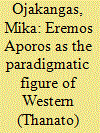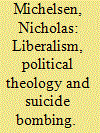|
|
|
Sort Order |
|
|
|
Items / Page
|
|
|
|
|
|
|
| Srl | Item |
| 1 |
ID:
122993


|
|
|
|
|
| Publication |
2013.
|
| Summary/Abstract |
The originary figure of the Western political subject is neither the Aristotelian zoon politikon nor the Agambenian homo sacer but the Socratic eremos aporos. Like the Agambenian homo sacer, the Socratic eremos aporos is abandoned by his fellow citizens, not outside the polis but in the polis, being a refugee in his own city. He lives, as Callicles says of Socrates in Gorgias (486c), "in his city as an absolute outcast." Moreover, like the Agambenian homo sacer, the Socratic eremos aporos also lives in a state close to death-"in a state as close to death as possible," as Socrates says of himself in Phaedo (67d). However, there is a decisive difference between the Agambenian homo sacer and the Socratic eremos aporos. Unlike homo sacer, the Socratic political subject is not abandoned by the sovereign but by himself through his own traumatic self-accusation. Furthermore, although eremos aporos is also a "living corpse," he is not thereby at mercy of the sovereign. On the contrary, it is he who has become sovereign, not because he has somehow managed to sublate his condition as abandoned and forlorn subject, but because this condition is the condition of sovereign freedom. In other words, it is neither his biological life in the order of nature (zoe) nor his form of life in the symbolic order of the polis (bios), not even his exposure to the threat of imminent death (homo sacer), but his symbolic suicide that renders him a sovereign individual subjected to no one. By removing the subject from his proper place in the symbolic order of the polis, such a suicide not only discloses subject's unlimited responsibility but also renders him capable of transcending his limited position as a living being and becoming a thanatopolitical subject of his own biological death. Although such a subject also affirms life, life that is affirmed here is not mere life but sovereign life in the shade of the instinct of death.
|
|
|
|
|
|
|
|
|
|
|
|
|
|
|
|
| 2 |
ID:
124627


|
|
|
|
|
| Publication |
2013.
|
| Summary/Abstract |
This article sets out to interrogate the relationship between Liberalism and suicide bombing. It maps and critically examines accounts of suicide bombing as a practice diametrically opposed to the secular logics of liberal governance, or as the direct expression of the traces of sovereign exceptionalism that haunt the global operation of Liberal biopower. I argue that a uniquely liberal analytic of human finitude establishes conditions of political intelligibility for suicide bombings today. As such, the contemporary politics of suicide may be understood as in critical communication with liberal political theologies of immanent governance over the human qua mortal, rather than as structurally deriving from political theologies of sovereign power.
|
|
|
|
|
|
|
|
|
|
|
|
|
|
|
|
|
|
|
|
|